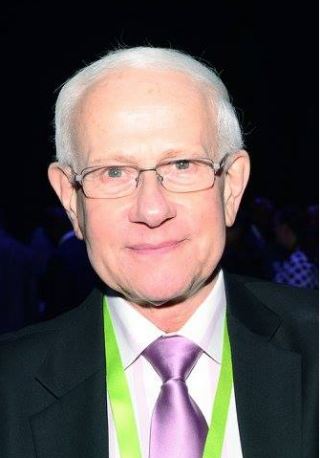Transport Sector Retirement Fund recognised by industry peers as innovative trailblazer
Mover-shaker Transport Sector Retirement Fund recognised as national industry leader
The Transport Sector Retirement Fund (TSRF), a non-aligned, standalone fund whose shareholders are its members, has been recognised by its peers as an innovative trailblazer in the industry. In January this year, the TSRF was awarded top honours at the Institute of Retirement Funds Africa (IRFA) annual Best Practice Industry Awards for 2018.
The TSRF received the overall Gold Standard Award for meeting all the criteria in the following areas of excellence: governance; transformation; stakeholder engagement and education; investment practice, trustee development; and financial management and reporting. The fund also won the Investment Practices category and received a Best Practice certificate in the Transformation category.
Joe Letswalo, principal officer of the TSRF, says the fund differentiates itself from many others with its single-minded focus on maximising members’ benefits and making a tangible difference in members’ lives. “We have a very strict impact-driven investment orientation which enables us to achieve our set growth targets. We recently improved members’ death and disability benefits from two times annual salary to three times annual salary, and funeral cover from R30 000 to R50 000 for the member and spouse at no increase in costs to them. All the proceeds of the funds’ initiatives are reinvested and we pursue ways of finding savings, such as the more than R700-million we have generated through our self-insurance initiative.”
The fund has about 70 000 members, 70% of whom are truck drivers working in one of the many sectors in the transport industry. “With them in mind we have developed a responsible-investment strategy to build truck stops that ensures our members and the broader transport sector community are able to park and sleep safely and also have access to accommodation, refueling, mechanical services, primary healthcare- and appropriate nutrition facilities,” says Letswalo. “The first of these truck stops, the Harrismith Highway Junction Truck Stop, is one of the biggest in Africa and has provided a more than 25% return on investment over the past 12 months. It is now one of the largest work providers in Harrismith, employing 200 locals.”
Letswalo is justifiably proud of the TSRF’s engagement and education strategy, which strives to improve members’ knowledge of fund benefits and investments. The preferred communication method is SMSes, with online media, including the TSRF’s website and Facebook, also being successfully deployed in staying in touch with members. Regular clear communication messages help to keep members abreast of an array of financial concepts. “We don’t pay lip service to effective stakeholder engagement,” says Letswalo. “The majority of members access the internet via their cellphones and so we’ve adapted our communication strategy accordingly. Our website is now the top source of information on the fund. Members prefer to access fund-related information by this means. We are talking directly to them.”
As far as transformation is concerned, the TSRF has placed a target of more than 70% of its assets to be managed by black-owned investment firms. “To date 75% of the fund’s assets are invested with black-owned and transformed managers,” says Letswalo. “We’ve extended this to our stockbroker policy, which gives clear guidelines on the percentage allocation given to black-owned firms. In addition, all the asset managers appointed by the fund allocate more than 50% outsourcing to black-owned business.”
The fund’s achievement of its transformation objectives has not always been smooth sailing. A number of initiatives had to be adopted to ensure the sustainability of the transformation success. The objective was for the fund to walk the transformation journey with its appointed asset managers to ensure success.
“We realised that the playing fields for our appointed asset managers were not conducive to maintain the success levels, especially with regards to competition with the more well-resourced and established traditional asset managers, says Letswalo. “So, the fund convened an indaba with all the appointed asset managers whereby issues related to performance, good governance, resourcing, support and best practice were discussed. It was important that the asset managers understood that the fund’s success is also their success. At this meeting, they again unanimously pledged to uphold best governance procedures and to cooperate to advance the fund’s transformation agenda.”
Furthermore, TSRF’s robust internal controls, including frequent internal audits to evaluate best business practices and address potential risk factors, allow the fund to excel in good governance and compliance. The fund received clean internal and external financial audits for the past eight years.
Having grown the TSRF’s assets from R2-billion in 2013 to R7.5-billion in 2018, Letswalo is confident that the fund’s outlook is positive and its various strategies on target. “We are definitely shaking up the industry with our nimble investment strategies and people are really starting to sit up and take notice. We run a clean business where we place our members at the heart of it, and we are grateful that the industry has given us recognition for it,” says Letswalo.
The best defence against corporate failure...Individual Integrity
The best defence against corporate failure … Individual integrity By Auguste Coetzer* and J. Michael Judin**
Integrity has no expiry date. You’ve either got it or you haven’t. An honest, diligent company director does not become a crook on the make the moment some arbitrary term limit has been exceeded.
This states the obvious. However, current pressures in the realm of corporate governance and audit practice suggest now’s a good time to remind ourselves of basic principles in the conduct of business and the behaviour of directors. Inevitably, the implosion of the Steinhoff retail group and revelations about the role of Gupta-linked companies in state capture have raised questions about the ability of current regulation – specifically the King IV guidelines – to combat wrongdoing and sharp practice. The focus has fallen on the tenure of directors and audit firms. Long-term appointments supposedly contribute to cosy relationships and an ‘old boys’ club mentality’, allegedly compromising professional scepticism and rigorous scrutiny of corporate actions and accounts.
The supposed solution is frequent rotation of independent non-executive directors and audit firms. Pressure appears to be growing to get old faces out and new faces in. Momentum is such that it is almost certain mandatory audit firm rotation (MAFR) will be legislated locally while the definition of independence may be revisited, perhaps resulting in the automatic lapsing of independent status after nine years (on the British model). Currently, under section 92 of the Companies Act, audit partner rotation is mandatory in South Africa, not audit firm rotation, while King IV allows boards to exercise their judgment when an independent non-executive director appears to offend any of the criteria for independence, as long as a board can justify its view that independence of judgment and action is unimpaired. This may change as those calling for further legislation punt the merits of regular rotation. In effect, the proponents of rotation play up the benefits of a shake-up while playing down the value of experience. The danger is that institutional memory and industry knowledge will be sacrificed with no assurance new perspectives will improve company performance or corporate governance. Past errors might be repeated, incurring unnecessary costs while endangering competitive advantage and jobs.
Experience has traditionally been regarded as a key component of wisdom and a precondition for forward planning. Confucius tells us ‘By three methods we may learn wisdom: First, by reflection, which is noblest; Second, by imitation, which is easiest; and Third, by experience, which is the bitterest’. Of course, experience at the highest level – in the boardroom – is especially hard won. It should be noted that experience is still being gathered with MAFR. This state of flux has not impeded the global trend to mandatory rotation.
The EU has introduced MAFR, with a 10-year cap on client-auditor tenure. Brazil has a five-year cap, as does China (for banks and SOEs) while the UK prefers a 10-year limit. Yet a growing body of research suggests presumed benefits cannot be substantiated and the risks of auditing failure are higher in the early years of a relationship; undercutting arguments about complacency setting in over time. The efficacy of rotation as a defence against fraud is also open to question. MAFR was in place in Italy years before the Parmalat scandal, but was no defence against frauds so massive they rocked the country. Sometimes doubt sets in after prolonged trial. For example, Spain embraced the concept for several years, then dropped it. Research continues and real-life experience is still being gathered. However, arguments in favour of a wait-and-see approach appear to have lost ground to growing agitation for regular rotation of audit firms and independent directors. The challenge for proponents and sceptics alike is how to make the best of these changes when they come.
Clearly, the known risks should be addressed; for instance, the danger that rotation will deplete industry knowledge and institutional memory. One suggestion here is that a phasing-in period be introduced. The established audit firm (or established directors) could remain on board while replacements learn the ropes and draw on the experience of their immediate predecessors. With corporate change on the near-term horizon, it is also appropriate to focus on challenges specific to South Africa; such as the need to strengthen boardroom diversity. Here, the phasing-in principle might be extended to include a mentorship period for newly appointed young directors. While welcoming a new generation of directors, it makes sense to confront a generational issue – low levels of digital literacy on ageing boards of directors. A McKinsey Quarterly article of 2016 noted that “only 116 directors on the boards of the Global 300 are digital directors”. Furthermore, two McKinsey surveys report that only 17% of directors say their boards are sponsoring digital initiatives while only 16% say they fully understand how industry dynamics are changing in the face of digital attack. Yet one in three directors believe digital disruptors will overturn their business models in the next five years.
In response, some US firms are setting up technology committees while hiring chief digital officers and appointing digital directors. South African companies face similar challenges, though board composition may not yet reflect their willingness to cross the digital divide. The geek with the knowledge and insight to save a traditional organisation from digital disaster is probably under-30 with a ring in his (or her) nose, and you don’t see many directors answering to that description in South African boardrooms. In all these rotational, mentorship, diversity and digital scenarios, we should acknowledge that a key issue is talent availability. South Africa’s skills pool is limited. The number of experienced, proven and respected individuals with sound directorial credentials is finite. We can legislate change, but we then have to find the people to make the changes work. Clearly, integrity and intellectual honesty are non-negotiable. They are the critical requirements of all contributors to company performance, whether newcomers to the boardroom or old hands A shake-up that weakens corporate governance must be avoided at all costs. Ethical leaders with strong values are the best guarantee that change is a change for the better.
*Auguste Coetzer is a Director of Signium Africa (previously Talent Africa), a leading South African-based executive search and talent management company servicing sub-Saharan Africa. www.signium.co.za
**J. Michael Judin is a partner in the Johannesburg law firm of Judin Combrinck Inc. www.elawnet.co.za Though he writes here in his personal capacity, he is on the King Committee, was part the task team that wrote King IV™ and chaired the subcommittee on the chapter dealing with negotiation, mediation and arbitration as contained in King III. He is a non-executive director of, and legal adviser to, the American Chamber of Commerce in South Africa and co-chairman of the Corporate Governance International Development Subcommittee of the American Bar Association’s business law section.
Global Contact Centre Association invest in SA BPO & Contact Centre Industry
ContactCentreWorld.com, the Global Association for Contact Centre and Customer Engagement Best Practices and Equilibrium Business Lab, a South African BPO & Contact Centre Consultancy recently announced a strategic partnership to help bring the South African and Global Contact Centre World closer together.
The partnership gives the South African BPO and Contact Centre Industry access to a global network of close to 200,000 industry professionals, unrivaled tools and resources to develop the skills, industry knowledge, experience and recognition programs. The partnership recently launched ContactCentresSA.com and its Top Ranking Performers National Awards. This exclusive award program. gives local industry professional an opportunity to compete against the best in South Africa and the globally through ContactCentreWorld.com.
Raj Wadhwani, President of ContactCentreWorld.com: "We have seen the industry in South Africa grow substantially in skills and sophistication. The passion of the people is infectious and we are delighted to partner with Equilibrium Business Lab to help grow and develop the industry further. We have worked with Naz Salie, founder of Equilibrium Business Lab over the past year and are excited by the plans she and her team bring to the South African industry".
Naz Salie, Managing Director of Equilibrium Business Lab and previous South Africa Industry Head for BPESA: "We are honored to be part of an alliance that will enable Equilibrium Business Lab to deliver world class solutions to our industry and complement the existing support structures in South Africa.
About ContactCentreWorld.com
ContactCentreWorld.com is the world's premier on-line resource for the call and contact Centre industry. This article is one of hundreds available on-line to registered members. Our resource is updated every working day and includes content from every corner of the world. If you are not a registered member go to www.ContactCentreWorld.com and register today.
Raj Wadhwani President, ContactCentreWorld.com www.contactcenterworld.com
About Equilibrium Business Lab
Equilibrium Business Lab provides businesses operating in the BPO & Contact Centre Industry with business development, marketing and branding solutions. Working hand in hand with business teams, develop cutting-edge, actionable and sustainable strategies. Equilibrium brings together a complimentary mix of business skills, creative talent and a passion to for developing sustainable relationships.
Naz SalieDirector – Equilibrium Business Lab
This email address is being protected from spambots. You need JavaScript enabled to view it.




